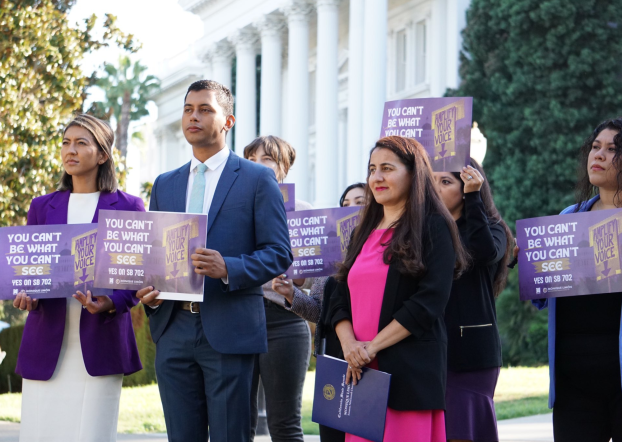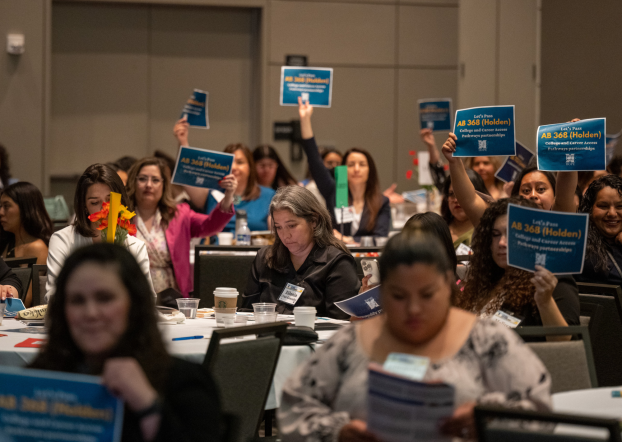Legislative Priorities
About HOPE's Advocacy Efforts
HOPE is a fierce advocate for building Latina economic power and political influence. We have impacted the lives of millions of Latinas in California and our nation by promoting policies that advance economic empowerment, affordability and access to higher education, civic engagement, and affordable healthcare — all of which overlap to affect the prosperity and wellbeing of Latinas everywhere.
Our Issue Areas
Economic and Educational Parity
Latinas are eager to pursue higher education as the strongest pathway to thriving communities, and our businesses and purchasing power drive the economies where we live. Yet we fight against a systemic education opportunity gap, widening pay gaps, and underinvestment in our work that impact not only our immediate financial well-being and quality of life, but also long-term economic stability, curtailing Latinas’ ability to build wealth and harming the entire economy. HOPE advocates for legislation that addresses these issues by making space for our languages in the classroom, comprehensively supporting Latina students to pursue higher education, bolstering Latina businesses and workers, improving financial literacy, creating transparency in pay, and more.
Civic Engagement and Representation
Latinas make up a fast-growing share of the United States population, and our voices must be heard. We believe that democracy and governance are stronger when everyone has a seat at the table. It takes work to battle generations of discrimination and a lack of transparency that have limited Latinas’ access to voting and leadership. That’s why HOPE supports legislation that improves voting access, promotes diversity and inclusion in the workplace and all positions of leadership, and ensures we’re represented accurately in data collection.
Health Care Access and Equity
Health care is a human right. But Latinas face compounding challenges to accessing it, and dire health outcomes as a result. The COVID-19 pandemic worsened longstanding inequities, resulting in higher rates of job and insurance loss; economic disparities are driving high rates of medical debt; mental health crises are at record levels especially among people of color; and the healthcare workforce is stretched thin, with Latinas sorely underrepresented. HOPE supports legislation to expand access to health insurance and care, especially for undocumented and low-paid workers.
2024 Legislative Priorities
HOPE is actively advocating for the passage of the following bills which aim to implement solutions to some of the most pressing challenges facing Latinas in California. HOPE’s 2024 policy platform that addresses Representation, Economic and Educational parity, and Health Care access and equity.

AB 1780 (Ting) Ending the Use of Legacy Admission Practices
HOPE SPONSORED BILL
STATUS: Signed.
Policy Win: Governor Signs AB 1780 (Ting) into Law, Advancing Equitable Admissions for All!
We are excited to share that Governor Gavin Newsom signed AB 1780, authored by Assemblymember Phil Ting (D-San Francisco) into law, which bans the preferential admission of students with ties to alumni or donors at private nonprofit colleges! HOPE was proud to co-sponsor this legislation alongside the Campaign for College Opportunity and Asian Americans Advancing Justice to ensure that every student has a fair chance to attend their dream school!

SB 782 (Limón) Transparency in Gubernatorial Appointments
HOPE SPONSORED BILL
STATUS: Vetoed.
Encouraging Progress Despite Setback: Governor Newsom Vetoes SB 782 (Limón) and Commits to Consider Expanded Reporting in 2025
Governor Gavin Newsom has vetoed SB 782, authored by Senator Monique Limón, legislation cosponsored by HOPE and the California Commission on Status of Women and Girls. SB 782 would have required the Governor’s office to produce an annual report detailing the demographic information—including race, ethnicity, gender, veteran status, and region of individuals appointed by the Governor each year.
We know that meaningful change for our communities takes time, and while this veto is a setback on our larger effort to ensure greater transparency, we are still one step closer to #ACaliforniaLikeMe. Thanks to your support, we built incredible momentum advancing the legislation this year:
- SB 782 was made a caucus priority by nearly every legislative caucus for the first time the legislation was presented in 2021.
- Over 45 organizations representing diverse voices across the state joined our #ACaliforniaLikeMe coalition.
- Governor Newsom acknowledged the public value of the report that SB 782 would provide in his veto message. He also committed to supporting legislation next year that includes the same transparency requirements for appointments by both the Administration and the Legislature, which creates a pathway forward for future advocacy.
HOPE remains committed to advocating for transparency and equity in appointments and will continue working to ensure all communities have a voice at decision-making tables. Stay tuned for more updates on how you can join us in this work!

AB 359 (Holden) College and Career Access Pathways
STATUS: Vetoed.
The Work Continues: Governor Vetoes AB 359 (Holden), a setback for scaling dual enrollment in California
Governor Newsom vetoed AB 359, which would have ensured the longevity and success of College and Career Access Pathways (CCAP) dual enrollment program by streamlining the establishment of new CCAP partnerships and removing key implementation hurdles local education agencies and community colleges face. In doing so, AB 359 aimed to make dual enrollment the norm in California schools by 2030 and ensure that Latinas and other underrepresented students benefit from these programs equitably.
We know reforms to CCAP are urgently needed to maximize the participation of underrepresented students, increase college completion, and close educational equity gaps in the state. HOPE remains committed to advancing legislation that addresses these issues and looks forward to working with the Governor and Legislature to ensure all students have equitable access to dual enrollment opportunities.

AB 3161 (Bonta) Equity in Health Care Act: Ensuring Safety and Accountability
STATUS: Signed.
Policy Win: Governor signs into law AB 3161 (Bonta) to close health inequities in California!
For more than three decades, HOPE has advocated for the elimination of health disparities and equal access to quality and affordable healthcare for all. Despite continued advancements in medical care, stark racial disparities in health outcomes and treatment have persisted in the United States. Every person, regardless of race, ethnicity, or socioeconomic status, deserves equitable access to safe and dignified health care. We applaud Governor Newsom for signing these two critical bills into law, both vital tools in our ongoing efforts to build a healthier, more equitable California.
AB 3161 (Bonta) requires hospital safety plans to include sociodemographic data to better address disparities in health outcomes. The bill also requires hospitals to update their patient safety plans to include anonymous reporting options and a process for addressing racism and discrimination.

AB 2319 (Wilson, Weber) California Dignity in Pregnancy and Childbirth Act
STATUS: Signed.
Policy Win: Governor signs into law AB 2319 (Wilson, Weber) to close maternal health inequities in California!
For more than three decades, HOPE has advocated for the elimination of health disparities and equal access to quality and affordable healthcare for all. Despite continued advancements in medical care, stark racial disparities in health outcomes and treatment have persisted in the United States. Every person, regardless of race, ethnicity, or socioeconomic status, deserves equitable access to safe and dignified health care. We applaud Governor Newsom for signing these two critical bills into law, both vital tools in our ongoing efforts to build a healthier, more equitable California.
AB 2319 (Wilson and Weber) strengthens the California Dignity in Pregnancy and Childbirth Act to further address the continued racial disparity in maternal morbidity rates and change the way that healthcare providers recognize and overcome their own implicit bias when treating pregnancy.
2023 Legislative Highlights
In 2023, HOPE was proud to unite with coalition partners and Latina leaders to advocate for critical policies that drive Representation, Economic and Educational parity, and Health Care access and equity.

Assembly Bill 368 (Holden)
#EducationEquity
Governor Newsom signed into law AB 368, authored by Assemblymember Chris Holden and co-sponsored by HOPE and The Education Trust–West. AB 368 will improve access to dual enrollment programs for students who may not already be college-bound or are underrepresented in higher education. The new law, taking effect January 1, will require the governing board of a community college district participating in a College and Career Access Pathways (CCAP) partnership to enroll high school pupils in any course that is part of a CCAP partnership offered at a community college campus. It also authorizes classes to be provided at the community college campus or the participating high school campus. AB 368 takes an important step in closing opportunity gaps in California’s education system, allowing more students to access resources previously only available to a select few.

Senate Bill 702 (Limón)
#ACaliforniaLikeMe
Governor Gavin Newsom vetoed SB 702, authored by Senator Monique Limón and sponsored by HOPE, designed to foster greater transparency and accountability in gubernatorial appointments. The bill would have required the office of the Governor to create an annual report on the demographic information currently being collected on individuals appointed by the Governor that year. This report would serve as a tool to highlight which voices and communities are missing from decision-making tables and offer concrete policy recommendations to diversify boards and commissions across the state. Despite the negative outcome, we remain motivated and ready to improve equity in the state’s commitment to a California for All. We look forward to further discussions on increasing transparency in the composition of appointments. Join our movement, sign up for our coalition, and get ready to continue these efforts in 2024.
Testimonial
HOPE’s work to influence legislation and budget priorities brings an important voice to the state and nation’s capital. Most importantly, HOPE has instilled in hundreds of Latinas from every part of California, every income level, every education level, and every industry sector, that civic participation is a responsibility.
Get Involved
Support HOPE AdvocacyContact
To learn more about HOPE’s legislative priorities and advocacy work, please contact Maria Morales, Policy Director.